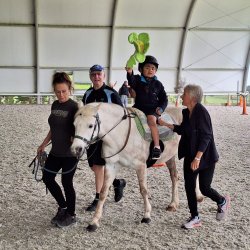Volunteers provide therapy and joy for the disabled and helpers

Imagine volunteering in a beautiful natural setting with an amazing view of Auckland from the countryside. That in itself is therapy enough for the soul. Add on top of that, transforming the lives of our young people who are struggling with functioning in every day life.
We’re at Totara Park Riding for the Disabled in Manukau, which offers children with disabilities a place to focus their brains through the rhythms of the horses movements and calms the mind to be at a normal pace. By actively balancing, they build their strength, posture, communication skills and focus their energy on constructive physical challenges.
Ann Chamberlain, a volunteer of 40 years service and ex-physio says the children learn consequences for their actions. If they stop holding the reins, the horse stops, and they really enjoy the horses constant rhythmic movement. They learn then, that they have to use their voice to get the horse going again. These are big developmental steps for the children – for whom holding something without letting go for a period of time is a challenge, let alone verbal communication.
Each of the children has a progress portfolio with their goals and achievements. At first each child needs three volunteers with them, to lead the horse and walk alongside. As they develop in their abilities, this can decrease to just one support person leading. A couple of more advanced riders in the group are developing the ability to trot. They are nearly there and have now stabilised their ride to single-handed rein holding at times, waving out to their care-givers and drinking water from a plastic cup.
There was a new boy today. He was nervous at first, understandably. He was put on the horse backwards. He was soon enjoying himself and facing forwards to new challenges. Some of the volunteers present had roles in the grounds and stables and one in the kitchen looking after the other volunteers. Jan was ensuring fresh water was available for the horses upon their return. ‘They get hay in their water and then they won’t drink it’ she explains smiling happily.
Shirley is over 80 years old and has been helping for the past 20 odd years. She has a grown daughter, who when younger, also attended the programme. Now Shirley is giving back, as she loves to see the joy on the children's faces. She also knows how much the programme helps the children now her own is married with young ones.
Shirley, who was an Occupational Therapist, is now happy for the interaction with the other wonderful and supportive volunteers. ‘I am no longer able to help with the horses, but I enjoy coming, so I make the tea now.’
Fellow volunteers Doug and Cliff discuss the deep satisfaction they get from seeing the amazing improvement in the kids. It’s all about the kids, watching their faces light up and developing new skills, they say.
Jeanette also used to help leading the horses and has a background of horse ownership. When she was running marathons and completing half-triathlons she helped lead the horses and riders. Now her own MS (multiple sclerosis) means she can no longer lead, she now helps in the stables, where her rapport with the horses is obvious.
Linley says a few of their volunteers have disabilities, although all the volunteers must be able to work autonomously and be safety focussed. This means being switched on at all times and seeing what behaviours are causing reactions and noticing what is happening around them.
Assisting with the horse rides requires a high level of awareness, and a good level of fitness and strength, for the safety of the riders. She says sometimes people will come and it’s not for them. They may love the idea of being with horses, but the reality is, it is the riders we are here for. They are our focus and we cannot be distracted from their safety needs and development.
While many volunteers tend to be retired, younger adults like Melissa come three times a week. Melissa is qualified in early childhood and has worked on camps with children with ADHD – and sees the difference it makes to the children.
Cilla says they need more volunteers like that. The volunteers cover a wide range of roles and, apart from leading horses, Riding for the Disabled are also in need of grounds people for paddock maintenance, fencing, and mucking out.
By Rachel Bro
Volunteering Auckand Community Outreach Co-ordinator

